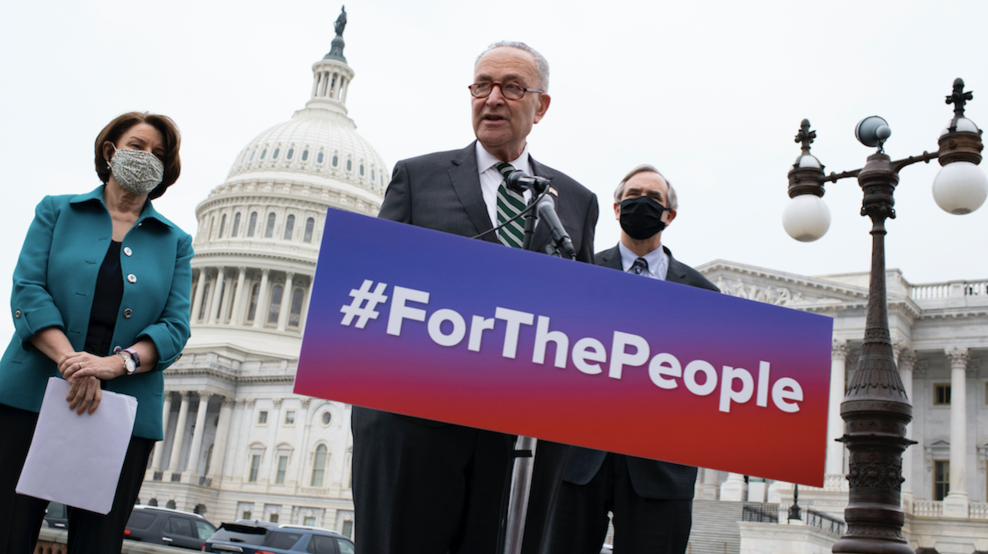
Senate Majority Leader Chuck Schumer (D-N.Y.) speaks during a press conference about election reform with Sen. Amy Klobuchar (D-Minn.) and Sen. Jeff Merkley (D-Ore.), at the US Capitol on March 17. Graeme Sloan/Sipa USA via AP
The Senate will hold its first hearing Wednesday on the For the People Act, the most significant democracy reform bill since the Voting Rights Act of 1965.
“This is the once-in-a-century moment to protect people’s right to vote,” Sen. Amy Klobuchar (D-Minn.), chair of the Senate Rules Committee, which is holding the hearing, told Mother Jones.
The For the People Act, which passed the House in March, is the Democrats’ answer to the GOP’s escalating war on voting. At a time when more than 250 bills to curtail access to the ballot have been introduced in 43 states, it would dramatically expand voting access through policies like automatic and Election Day registration and universal mail-in voting while blocking voting restrictions like new voter ID laws and discriminatory voter purges.
“With so much at stake, we need to not just protect and defend voting rights, we need to grow them as they’re coming under assault from so many states in this country,” said Sen. Alex Padilla (D- Calif.), who also sits on the Rules Committee and previously oversaw voting in California as the state’s secretary of state from 2015 to 2021.
But the bill, now known as S 1, will only clear the Senate if Democrats abolish the filibuster to approve it with a simple majority vote. Two centrist Democratic senators, West Virginia’s Joe Manchin and Arizona’s Kyrsten Sinema, have so far said they will not scrap the filibuster. Manchin, who co-sponsored an earlier version of the For the People Act in the last congressional session but has yet to do so this year, has also said he would not support exempting voting rights bills from the filibuster, an idea floated by Stacey Abrams and other prominent Democrats.
Nonetheless, Padilla said “there’s momentum and growing support” for filibuster reform among Democrats, pointing to Manchin’s openness to forcing Republicans to actually stand on the floor and speak continuously to block legislation, which would make filibusters harder to pull off and draw more attention to GOP obstruction. “It’s not elimination, but anything that leads to the filibuster being utilized a lot less is a step in right direction,” Padilla said.
“I thought it was pretty significant that Senator Manchin said he was open to the talking filibuster,” Klobuchar added. She signed a letter supporting the filibuster in 2017 but told Mother Jones in early March that she supported getting rid of it. She said S 1 “could well be” the issue that forces a showdown on the filibuster.
The right to vote is sacred. The Senate filibuster is not.
— Amy Klobuchar (@amyklobuchar) March 22, 2021
Padilla, who also supports ending the filibuster, said that in his conversations with Manchin and Sinema they were aware of the damage Republican obstruction could inflict on the Democrats’ agenda. (A 2013 bill sponsored by Manchin requiring background checks for gun sales, newly relevant in light of recent shootings in Boulder and Atlanta, received the support of 54 senators but was killed by 46 senators representing just 38 percent of the country.) “As I’ve talked to them a little bit and heard from them more than a little bit, their patience is starting to wear thin,” Padilla said. “They see the consequences of inaction.”
The wave of new voter suppression measures being passed by Republicans has intensified the sense of urgency among Democrats to get rid of the filibuster to pass S 1 and a companion bill, the John Lewis Voting Rights Advancement Act, to restore the provisions of the Voting Rights Act that the Supreme Court struck down in 2013. Following the Georgia runoff victories of Democrats Raphael Warnock and Jon Ossoff, Republicans in the state have proposed the biggest rollback of voting rights since the Jim Crow era.
“We wouldn’t have this hearing without people being allowed to vote in Georgia,” said Klobuchar, referring to the fact that the runoff wins gave Democrats control of the Senate. “Now we’re having a hearing at the same time Republicans in Georgia are trying to pull back the right to vote.”
“This issue is bigger than the filibuster,” Warnock said on the Senate floor last week. “I stand before you saying that this issue—access to voting and preempting politicians’ efforts to restrict voting—is so fundamental to our democracy that it is too important to be held hostage by a Senate rule, especially one historically used to restrict the expansion of voting rights.”
Senate Dems introduced For the People Act today, most important voting bill since Voting Rights Act
Mitch McConnell wants 41 GOP senators representing 21% of US to be able to block bill that would expand voting access for tens of millions of Americans pic.twitter.com/cUnj7wFyBE
— Ari Berman (@AriBerman) March 17, 2021
S 1 has come under fire not just from Republicans, who are waging an all-out propaganda war against it (Ted Cruz recently told conservative activists that Democrats want “rapists,” “murderers,” and “child molesters” to vote), but also from some election officials who told the Daily Beast that they were not consulted on the bill and it would be “a clutsterfuck” to implement.
But Padilla, who has overseen the largest state election system, said changes could be made to the bill when it is marked up next month to reflect the input of election officials. “That’s what the process is for,” he said.
And he noted that many of the policies included in the legislation, like automatic and Election Day registration and no-excuse mail-in voting, have already been implemented without major problems in states both red and blue. “We have to make sure we’re doing it right,” he said, “but there’s success stories to point to.”












